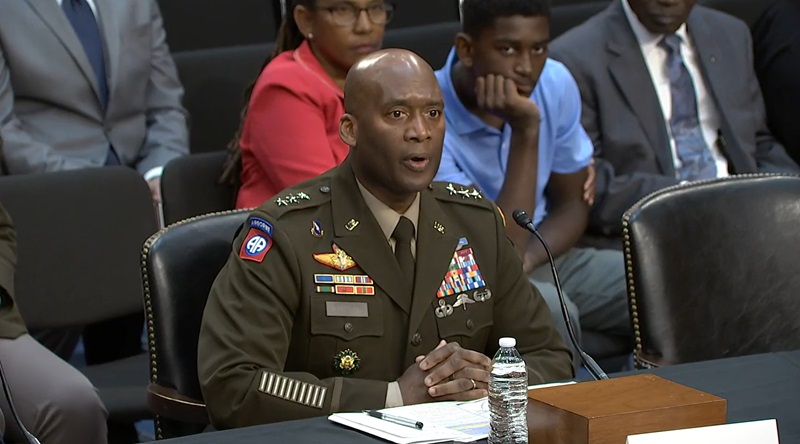Lt. Gen. Xavier T. Brunson, the nominee for the new commander of the South Korea-U.S. Combined Forces Command (CFC), identified North Korea’s nuclear and missile advancements as the “single greatest challenge” faced by the Korea-based command.
During his U.S. Senate Armed Services Committee confirmation hearing on September 17, Brunson stated, “North Korea’s rapid advancement of its nuclear and missile capabilities, combined with its stated ambition to exponentially expand its nuclear arsenal, is the single greatest challenge facing the tri-command.”
The three commands referenced are the Combined Forces Command (CFC), U.S. Forces Korea (USFK), and the United Nations Command (UNC), which Brunson will lead if confirmed by the Senate.

Brunson also highlighted his understanding of the threats Korea faces, emphasizing that maintaining combat readiness on the Korean Peninsula will be his primary role, while also ensuring the defense of the United States. “Most assuredly, I understand the need to defend the homelands,” he stressed.
Regarding North Korea’s recent disclosure of a uranium enrichment facility, Brunson suggested that the regime is attempting to “maneuver in the information space” by revealing something that has long been hidden.
“If confirmed, I would need to take a look at how we are maneuvering in the information space to counter the narratives that are put forward by that,” he said. “That causes tectonic shifts amongst Korean people when they see another facility because we all know that a facility that you can process uranium in is a facility that you can make warheads.”
Brunson also warned of the military cooperation between North Korea and Russia.
“The exchange of lethal aid between [North Korea] and Russia is a thing to be alarmed about, but most importantly what we have to do is see what’s coming back in,” he said.
“And in order to see that … it’s going to take the [intelligence community] to help us to see and understand what’s coming back, because, if confirmed, my job as [U.S. Forces Korea] commander would be to mitigate that, and that is part of our plans.”
Brunson pledged to push the intelligence committee to explore ways to exploit the Russian-North Korean partnership if confirmed. He expressed confidence that such authoritarian alliances cannot match the strength of the decades-long relationships the United States has built with its regional allies, including South Korea and Japan.
“I think that what we are learning from this is one of our strengths,” he said.
“United States forces are part of a network of friends, allies and partners that make us strong. The Korean peninsula is a great example of that — for 70 years this alliance has stood, and it is an example for other nations to look to. When you look toward authoritarian collusion that occurs between China and [North Korea] and Russia and Iran and others — they don’t have the same benefits that we have.”
Meanwhile, Brunson is currently serving as the commanding general of I Corps at Joint Base Lewis-McChord in Washington state. He oversees around 40,000 soldiers stationed across the Indo-Pacific region, focusing on maintaining a free and open Indo-Pacific, strengthening alliances, and enhancing interoperability.
Brunson holds a bachelor’s degree in political science from Hampton University in Virginia and was commissioned as an infantry officer in 1990. Over his 34 years of service, he has held various staff and command positions in conventional and special operations units and has participated in operations in Iraq and Afghanistan.
BY YOUNGNAM KIM [kim.youngnam@koreadaily.com]




![Green card interviews used as decoy for ICE arrests U.S. Immigration and Customs Enforcement (ICE) agents arrest a man after a hearing at an immigration court in Manhattan, New York, on Oct. 27. [REUTERS]](https://www.koreadailyus.com/wp-content/uploads/2025/12/1226-ICE-100x70.jpg)